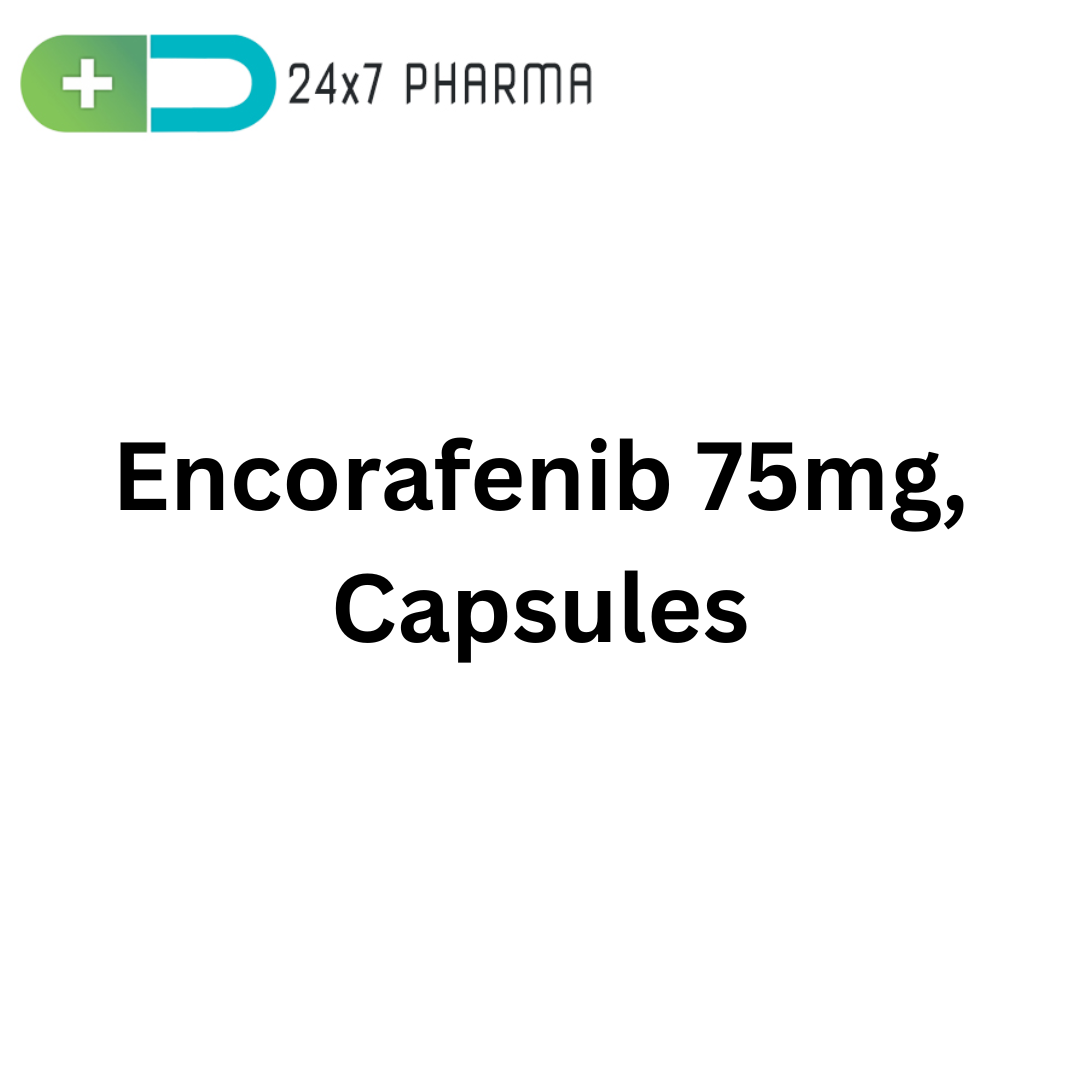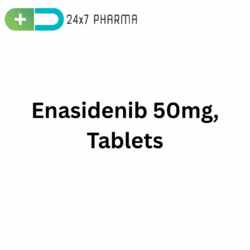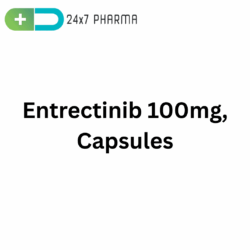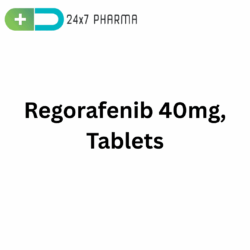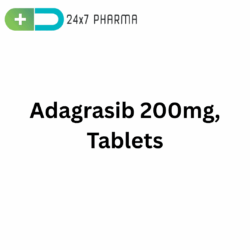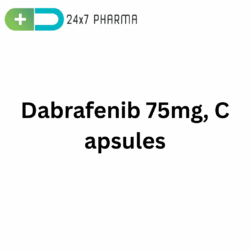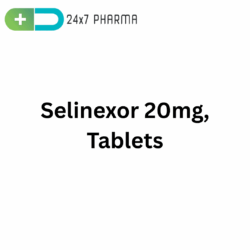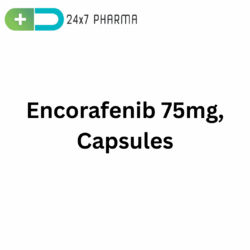LuciEncor 75mg, Encorafenib Capsules
LuciEncor 75mg contains Encorafenib, a targeted therapy used primarily in the treatment of certain cancers such as metastatic melanoma and colorectal cancer. Developed as a BRAF inhibitor, Encorafenib interferes with abnormal cancer cell growth by targeting mutations in the BRAF gene, most commonly the V600E mutation. LuciEncor is part of a precision medicine approach, meaning its effectiveness is largely dependent on specific genetic markers present in the patient’s cancer.
What is LuciEncor 75mg (Encorafenib)?
The oral cancer drug LuciEncor 75mg is categorized as a BRAF kinase inhibitor. It is frequently used in conjunction with other medications, such as the MEK inhibitor binimetinib, to treat metastatic or incurable melanoma that has a BRAF V600E or V600K mutation. When paired with cetuximab.x, it is also approved for the treatment of metastatic colorectal cancer that has the BRAF V600E mutation.
Encorafenib is not a general chemotherapy drug; instead, it works at the molecular level by inhibiting specific cancer-driving proteins.
Mechanism of Action / How it Works
Encorafenib’s primary target is the BRAF protein, which is essential to the MAPK/ERK signaling pathway, which controls cell survival and division. This pathway is unusually active in malignancies with a mutant BRAF gene, particularly V600E, which causes unchecked cell proliferation.
Encorafenib binds to the mutated BRAF kinase and inhibits its activity, thereby blocking downstream signaling that would otherwise promote cancer cell proliferation. When combined with MEK inhibitors like binimetinib, the blockade is enhanced, improving outcomes and reducing resistance.
How to Use / Indications
LuciEncor 75mg is indicated for the following conditions:
- Melanoma that has spread or is incurable and has a BRAF V600E or V600K mutation (when combined with binimetinib).
- BRAF V600E mutation-associated metastatic colorectal cancer (mCRC) (in conjunction with cetuximab).
Note: The presence of a BRAF V600 mutation must be confirmed through an FDA-approved diagnostic test before initiating treatment.
How to Take / Dosage
The dosage of LuciEncor 75mg can vary based on the indication and combination regimen:
Metastatic Melanoma:
- 450 mg of encorafenib once daily, usually taken as six 75 mg capsules.
- Binimetinib: 45 mg twice daily.
For Metastatic Colorectal Cancer:
- 300 mg of encorafenib once daily, usually taken as four 75 mg capsules.
- Cetuximab: Administered intravenously as per standard protocol.
Administration Guidelines:
- Take LuciEncor at the same time every day.
- It can be taken with or without food.
- Swallow capsules whole with water. Do not crush or chew.
- Other Dosage Forms and Strengths
LuciEncor is generally available in:
- 75 mg capsules
- 50 mg capsules (may be used for dose adjustments or titration)
- Dosage modifications may be necessary based on adverse reactions, renal/hepatic function, or drug interactions.
Side Effects
Like all cancer therapies, LuciEncor may cause side effects.
Common Side Effects:
- Fatigue
- Nausea and vomiting
- Constipation or diarrhea
- Joint and muscle pain
- Skin rash or acneiform eruptions
- Abdominal pain
- Headache
Serious Side Effects:
- QT prolongation (heart rhythm disorder)
- Hemorrhage
- Uveitis or eye problems
- Liver function abnormalities
- Secondary malignancies (e.g., squamous cell carcinoma)
- Serious skin reactions
- Monitoring: Regular blood tests, ECGs, and skin checks are essential during treatment.
Storage
- Store at 25°C (77°F); excursions between 15°C and 30°C (59°F and 86°F) are acceptable.
- Keep the capsules in the original container to protect from moisture and light.
- Keep out of reach of children.
- Do not use past the expiration date.
Benefits
The key benefits of LuciEncor 75mg include:
- Targeted Therapy: Offers a personalized approach to cancer treatment based on genetic mutation.
- Improved Survival Rates: When combined with binimetinib or cetuximab, it significantly improves progression-free survival (PFS) and overall survival (OS) compared to standard therapies.
- Oral Administration: Easier to administer compared to injectable chemotherapy.
- Reduced Tumor Burden: Demonstrated effectiveness in shrinking tumors and controlling disease.
Prescription
LuciEncor is a prescription-only medication and should only be used under the supervision of a medical oncologist. Prior to starting therapy:
- A BRAF mutation test is mandatory.
- A complete medical history and drug review should be done to avoid interactions.
- Regular monitoring schedules should be established.
Drug Interactions
Encorafenib is metabolized primarily by CYP3A4. Hence, co-administration with strong inhibitors or inducers of CYP3A4 can affect its levels.
Avoid:
- CYP3A4 inhibitors (e.g., ketoconazole, itraconazole, grapefruit juice) – may increase Encorafenib toxicity.
- CYP3A4 inducers (e.g., rifampin, phenytoin, St. John’s wort) – may reduce efficacy.
Use with Caution:
- Anticoagulants – bleeding risk may increase.
- Other QT-prolonging drugs – additive cardiac risk.
- Hormonal contraceptives – may be less effective; recommend alternative contraception.
Always inform your doctor of all medications and supplements being taken.
FAQs
Can LuciEncor cure cancer?
It is not a cure, but it can control disease, shrink tumors, and improve survival in patients with the correct mutation.
Is hair loss a side effect of LuciEncor?
Hair thinning may occur, but complete hair loss is rare compared to traditional chemotherapy.
Can LuciEncor be taken alone?
No, it’s typically used in combination with other drugs like binimetinib or cetuximab.
Is LuciEncor a chemotherapy drug?
No, it’s a targeted therapy that blocks mutated BRAF proteins in cancer cells.
How long should I take LuciEncor?
As long as it is effective and well-tolerated, or until disease progression.
Does LuciEncor cause hair loss?
Hair thinning may occur, but complete hair loss is uncommon.
Conclusion
LuciEncor 75mg (Encorafenib) represents a targeted and personalized therapy revolutionizing cancer treatment, particularly in melanoma and colorectal cancer with BRAF V600E mutation. Its ability to inhibit the abnormal BRAF signaling pathway enables more effective control over disease progression with fewer systemic toxicities compared to traditional chemotherapy.
However, due to potential serious side effects and drug interactions, LuciEncor should be used under close medical supervision, with appropriate diagnostic testing and regular monitoring. When used appropriately, LuciEncor can significantly improve patient outcomes, offering a beacon of hope for those with advanced-stage cancers.

